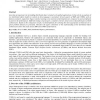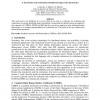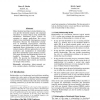140
click to vote
CORR
2011
Springer
14 years 9 months ago
2011
Springer
: - The Distributed object computing is a paradigm that allows objects to be distributed across a heterogeneous network, and allows each of the components to interoperate as a unif...
125
click to vote
SIGPLAN
1998
15 years 1 months ago
1998
Java has an important role in building distributed object oriented web enabled applications. In the article an analysis of two distributed object models in context of Java languag...
130
click to vote
CLEIEJ
1999
15 years 1 months ago
1999
This works goal is the definition of a set of criteria to be used as a reference for evaluation and comparison of existing distributed object technologies. In particular the defin...
105
click to vote
EDO
2000
Springer
15 years 5 months ago
2000
Springer
Abstract. We demonstratehow the use of synchronizationprimitives and threading policies in distributed object middleware can lead to deadlocks. We identify that objectmiddleware on...
116
click to vote
VLDB
1994
ACM
15 years 6 months ago
1994
ACM
Many relational and object-oriented database systems provide referential integrity and compound operations on related objects using relationship mechanisms. Distributed object sys...
119
click to vote
LCR
1998
Springer
15 years 6 months ago
1998
Springer
Abstract. Distributedobject middleware, suchas CORBA, hides systemand network-speci c characteristics of objects behind functional interface speci cations. This simpli es developme...
102
click to vote
WETICE
1999
IEEE
15 years 6 months ago
1999
IEEE
XML, as "the next generation ASCII", can play several roles in a distributed object system; one of the more exciting ones is as the basis for serialized data representat...
108
click to vote
WCRE
1999
IEEE
15 years 6 months ago
1999
IEEE
Legacy systems provide services that remain useful beyond the means of the technology in which they were originally implemented. Our Legacy Wrapper tool packages the services of a...
112
click to vote
IPPS
1999
IEEE
15 years 6 months ago
1999
IEEE
Collective operations on multiple distributed objects are a powerful means to coordinate parallel computations. In this paper we present an inheritance based approach to implement ...
IPPS
1999
IEEE
15 years 6 months ago
1999
IEEE
Abstract. Distributed Objects DO as de ned by OMG's CORBA architecture provide a model for object-oriented parallel distributed computing. The parallelism in this model howeve...



